The Voice of the Patient

The Voice of the Patient
The person behind the patient
I got my cancer diagnosis at 23. What first looked like a small fat ball in my arm turned out to be a synovial sarcoma. It was taken away, but the cancer never left me for long. Six years after my diagnosis came the first relapse, and later I lost my right arm. In the last 20 years I have had 10 surgeries, 2 rounds of chemo and 2 rounds of radiation.
Cancer has become quite a part of who I am, in those 20 years. But it never completely defines me. Yes, I am patient. But I am also still Freya, 43 years old, partner, mother, daughter, sister, friend, project manager. And an incorrigible bon vivant. An ordinary person, in fact.
Deciding together
I cannot stress it often enough: patients are first and foremost ordinary people. That’s why it is very important that healthcare professionals see the person behind their patients. Because it’s the only way doctors can give the right advice. ‘Deciding together' is ideal in theory. Of course, I see doctors who do it flawlessly. But I also see those who are still struggling with it. There are two conditions to be able to come to a 'joint decision'. First, doctors must take and be given the time to get to know the person behind the patient better. And secondly, patients must be provided with the correct information, if they are supposed to be able to make decisions.
The right information
An initiative such as My Cancer Navigator is exactly what cancer patients need for this. The fact that you can reach out to the information service with your complete file, and that doctors and researchers take the time to listen, to unravel your story and your trajectory, is a blessing. It not only helps you as a patient to better understand your disease, your treatment, and your trajectory. But it also arms you when you talk to your own doctors again afterwards: thanks to the help of My Cancer Navigator, you really know what it is about and you can really have a say and decide about your treatment process. ‘Informed consent,’ in the right sense of the word.
Encouraging patients
Provided the right attitude of both patient and healthcare provider, ‘patient empowerment’ is not an ideal, but a reality. I want to contribute to this with my information platform Klare Kijk op Kanker: anyone who watches the videos on our platform learns more about their disease in understandable terms, in a quick and concise manner. And there is more: I would like to teach patients about how to deal with being ill and about how to talk to your environment and to your doctors. If I have been able to help even just one patient through Klare Kijk op Kanker, then I am proud and grateful for that small difference.
My Cancer Navigator makes a difference
I am also grateful for an initiative like My Cancer Navigator, a service offered by healthcare professionals who want to see patients empowered, even though their fate is necessarily in the hands of a doctor. This is something that, after 20 years in the role of patient, is more than dear to my heart. Because in an ideal world where 'patient empowerment' is already fully established, doctor and patient are equal and share control over the treatment process. Unfortunately, that dream is not always reality today.
To me, ‘patient empowerment’ means that healthcare providers don’t forget that patients are human beings too, with unique needs at every point in their lives. And that caring for a patient is above all equal to caring for that person. Listening, informing and then 'deciding together'. In addition, it also means that those who are patients know that standing up for yourself is not wrong. That you may ask questions, voice concerns, seek second opinions. After all, it's your body, your life.
Bio Freya Rowaert
Freya Rowaert (43) received her first cancer diagnosis at the age of 23: synovial sarcoma in the arm. Six years later came the first relapse, later she lost her right arm to the disease. After 20 years, cancer has become a part of who Freya is. But it never completely defines her. Freya works as an oncology project manager for MSD. With their caring support, she develops the information platform Klare Kijk op Kanker. Together they want to contribute to a world with a better understanding of cancer and of who must live with it.
More about My Cancer Navigator, a free information service for people with cancer.
Discover the short video Freya Rowaert made about My Cancer Navigator.
